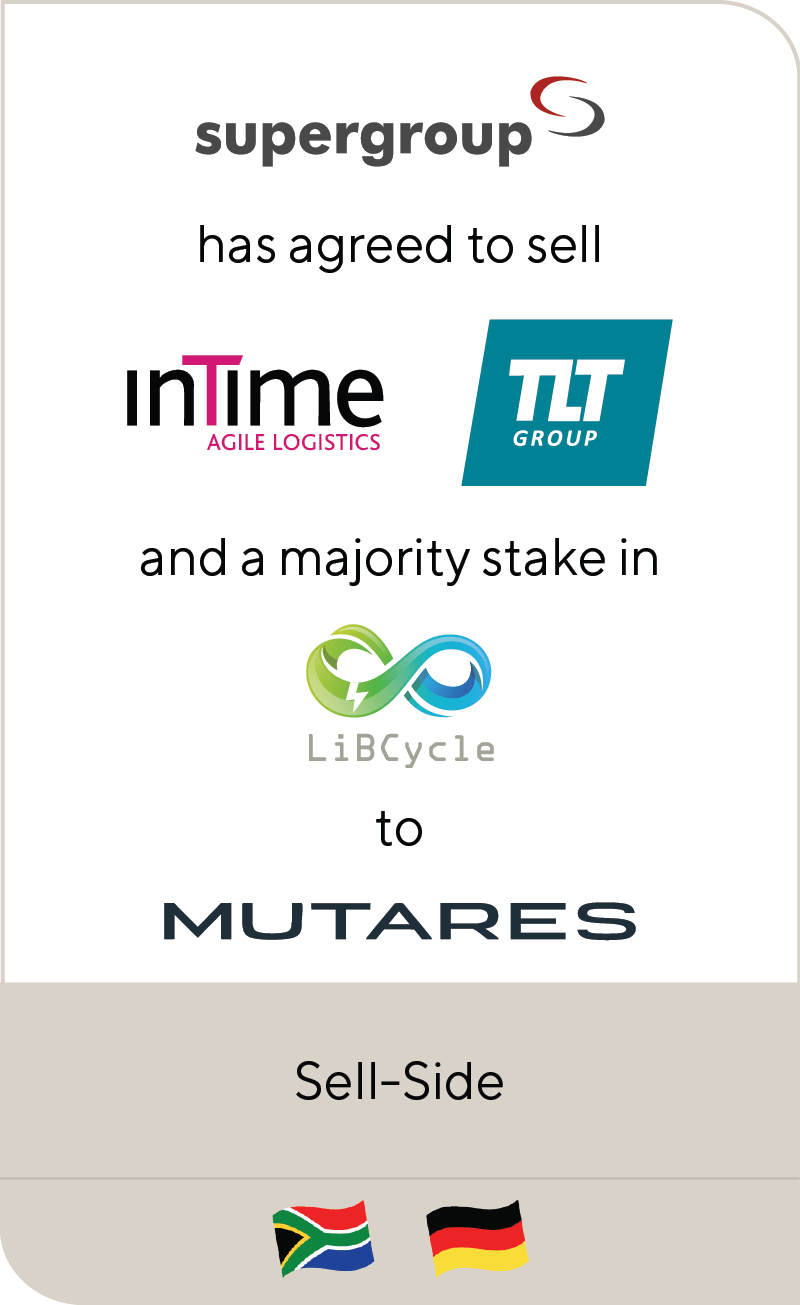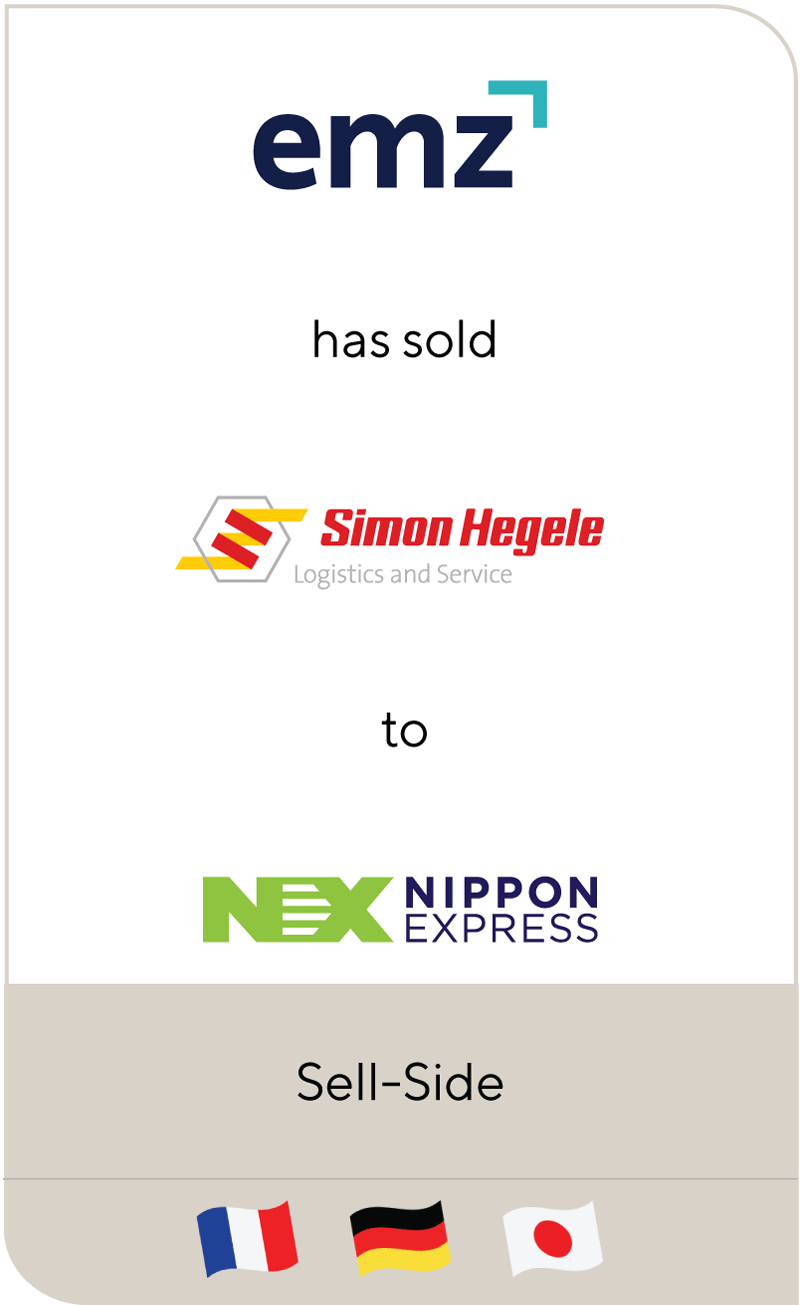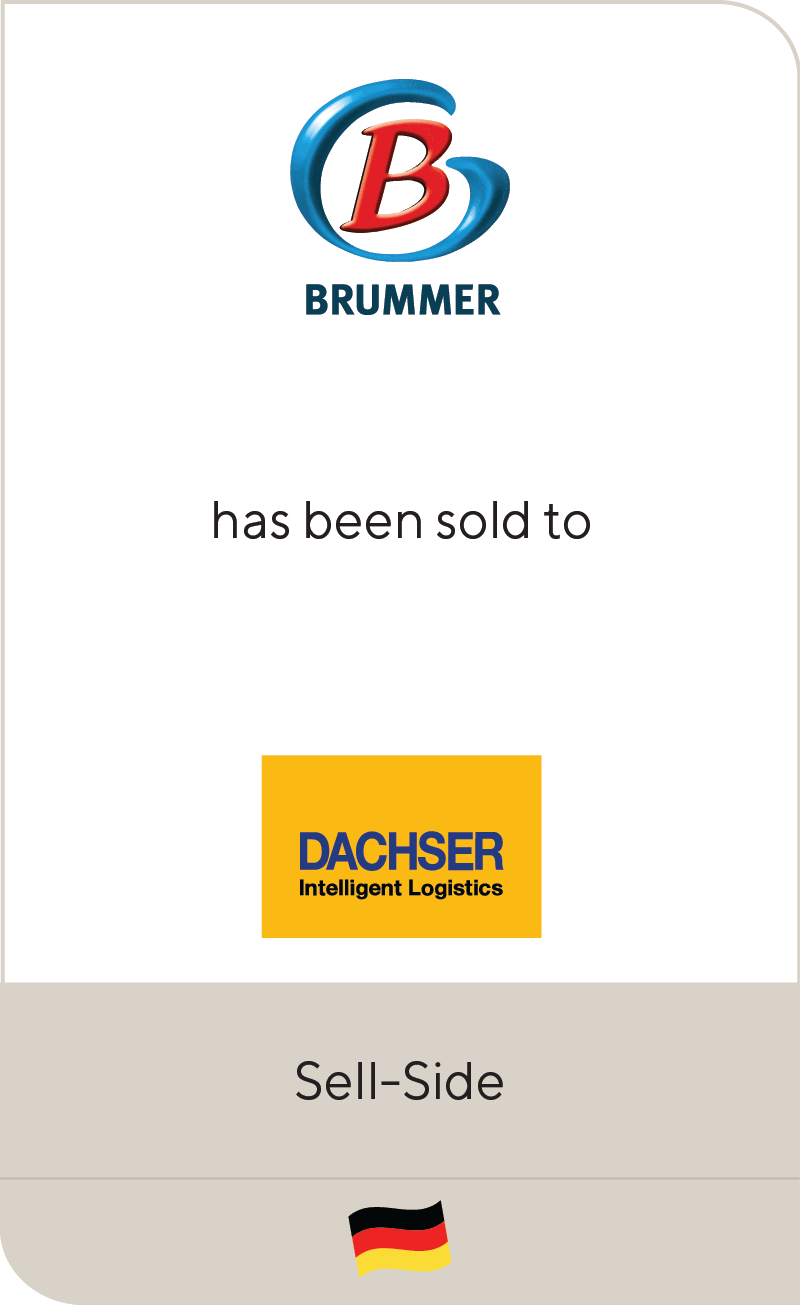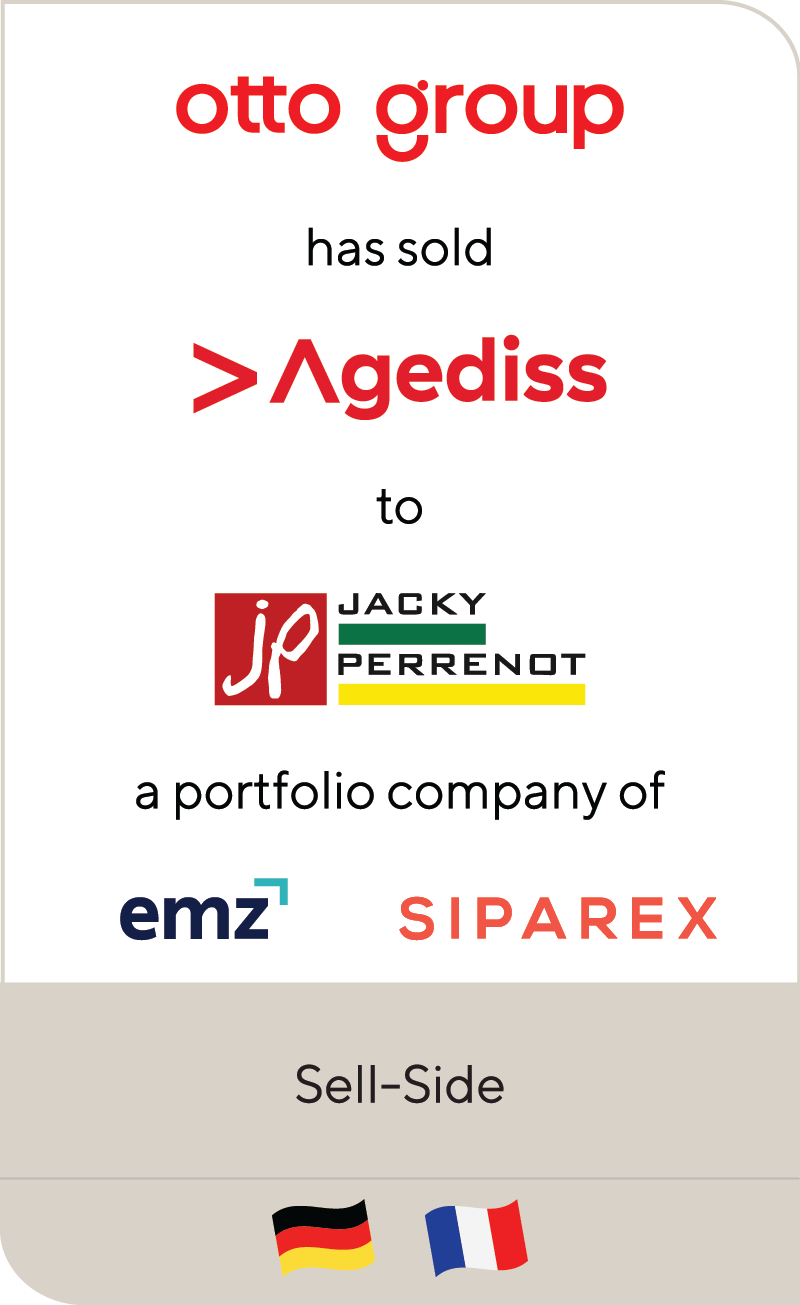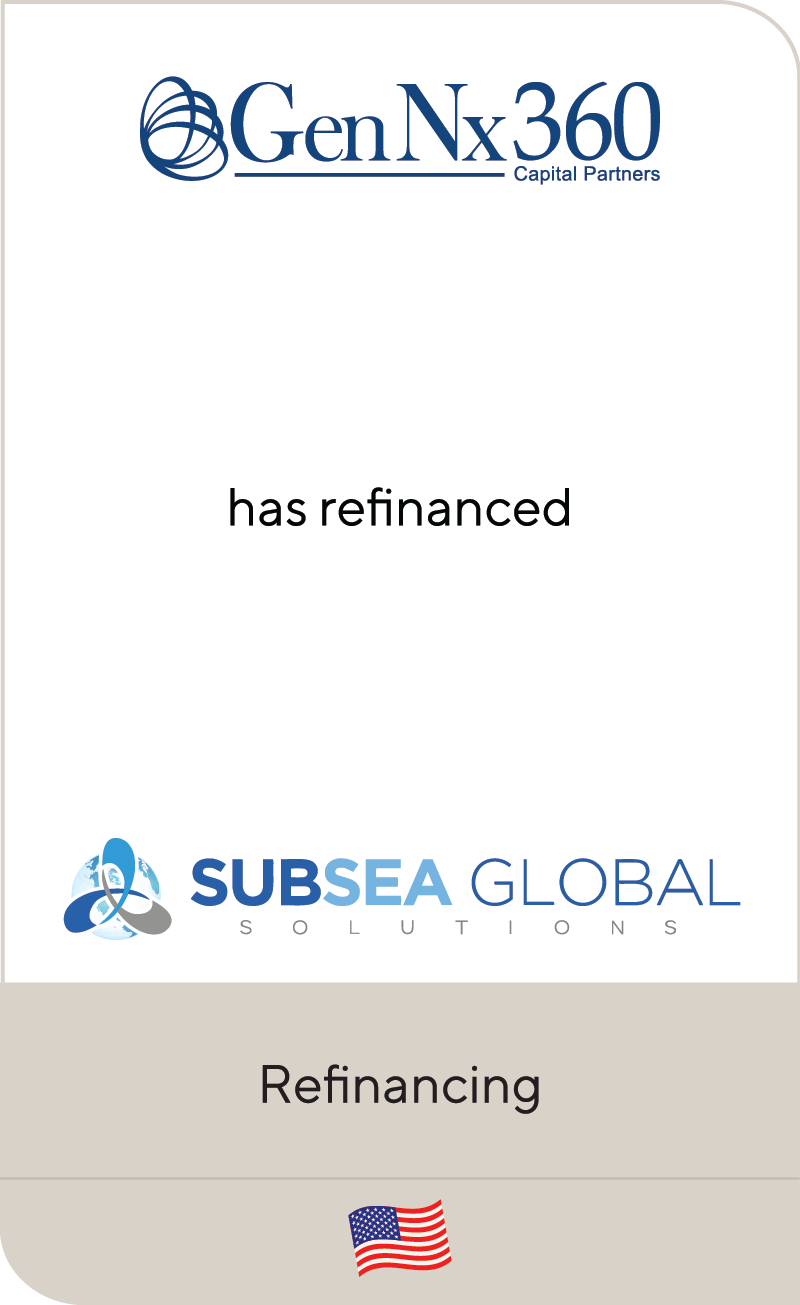The region with the most significant market size increase is forecast to be Sub-Saharan Africa, with the food and beverages logistics market spend expected to grow 13.1% year-on-year from €158.4bn in 2024 to a forecast €178.9bn in 2025. It has the highest regional 2024-2029 CAGR of 11.1%.
The region with the second highest regional 5-year CAGR is the Middle East and North Africa (MENA), at 7.4%. 2024 market size is €88.9bn and this is forecast to grow to €127bn in 2029.
The region with the lowest growth year-on-year is forecast to be North America. Whilst it currently has the second highest market size after Asia Pacific, at €458.1bn in 2024, it is forecast to only grow by 3.0% by 2029, to a market size of €536.3bn with a 2024-2029 CAGR of 3.2%. The South American food and beverages market size is forecast to grow by 6.0% in 2025.
Europe comes in third in the regional rankings, with a global food and beverage logistics market size of €352.6bn in 2024, which is forecast to grow to €430.6bn in 2029. The 2024-2029 CAGR is forecast to be 4.1%, the second lowest regionally after North America.
Global Food & Beverages: Logistics Market Size & Growth 2021 – 2029 (F)
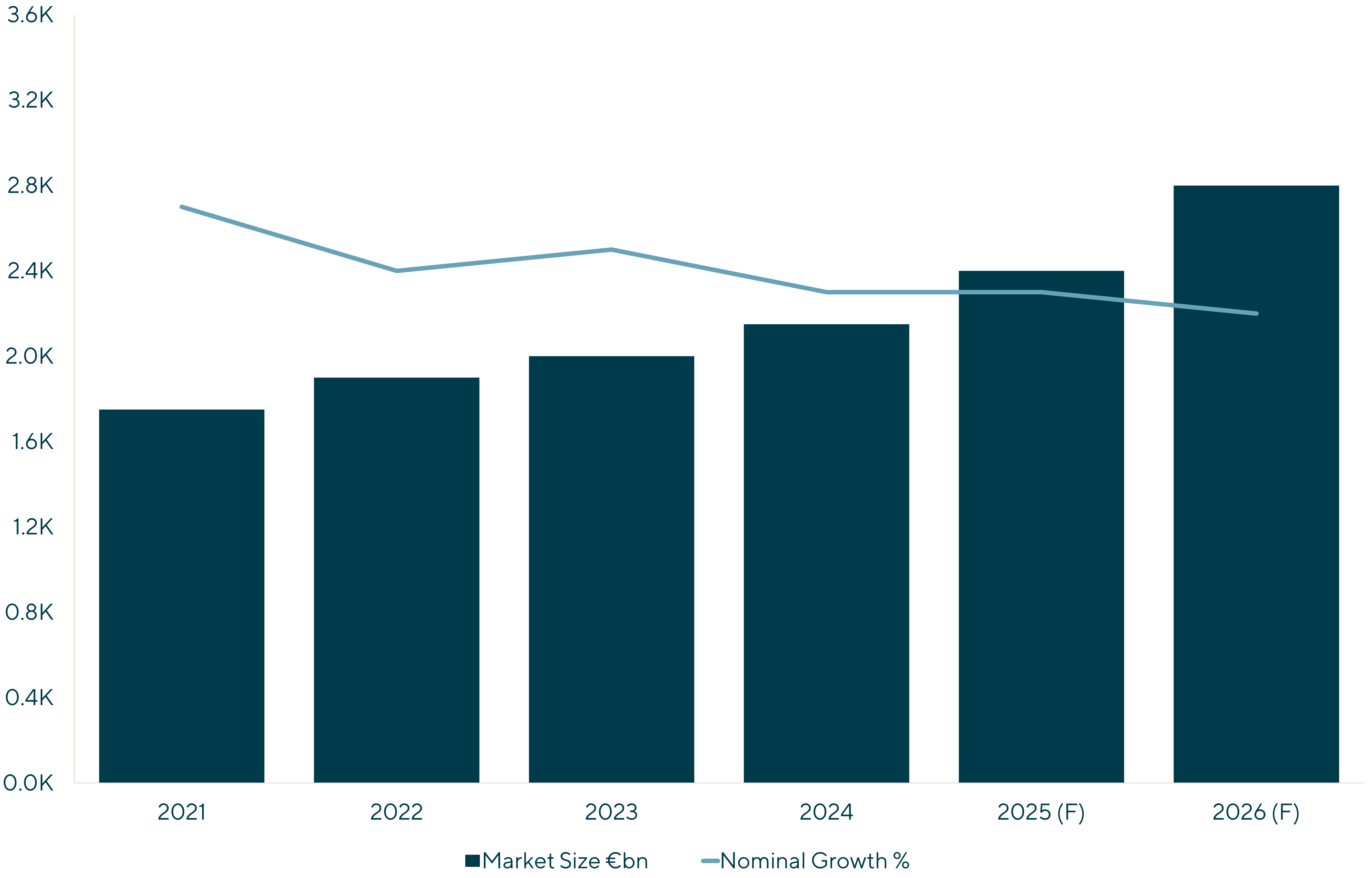
Source: Ti Insight
Top 5 Trends in Food & Logistics 2025
Logistics for food products is a fairly mature market in most advanced economies. The largest opportunities for change lie in the shift towards e-retailing in countries such as Germany, which have been slow in developing internet shopping. Emerging economies however offer major opportunities. India alone offers vast potential for the development of even quite simple food logistics provision and infrastructure. This is particularly the case for ‘cold chain’ services.
|
1 |
Rise of food e-retail |
|
2 |
Development of the retailing sector in Southeast Asia |
|
3 |
Growth of own brands/private labels |
|
4 |
Increase in trade or non-commoditized food products |
|
5 |
Evolving food transportation and geopolitical pressures |
Rise of Food E-Retail
Food sales through e-retail are more difficult than the sale of products such as consumer durables or even clothing. The complexity of the logistics systems designed to handle food is markedly higher than that of almost any other product category, possibly higher than that of pharmaceuticals.
The salient food e-retailer in the US is Walmart, leveraging its huge volumes to grab a very strong position in this segment of retail market. Amazon has invested considerable effort in building what it perceived as a mutually supportive physical food retail and internet capability, yet its market share of food retailing remains in low single digit percentages. Walmart has sustained a market share of just under 20% of the US food retail market, a share supported by Walmart’s food e-retail business.
UK e-retail is advanced and the market is characterised by the strong presence of specialist food retailer, Ocado, a dedicated e-retailer. It partly sells its own branded products and has a dedicated logistics infrastructure which is highly advanced in terms of the technologies used. Ocado is around the third largest by sales.
Other western economies vary in their approach. Japan, like Britain, has a strong e-retail grocery sector which at present is being led by the retailing Group Aeon. Germany is quite different. The food e-retail sector is generally small due to the difficulty of moving the distinctly German ‘discounter’ model to e-retailing. To a greater or lesser extent this is true in much of the rest of Europe, beyond perhaps Scandinavia and the Netherlands.
Development of the Retailing Sector in Southeast Asia
One of the salient characteristics of the region is the strength of its traditional retail sector and the local supply chains that support it. These show no signs of disappearing even as income per head in the region increases.
The development of the traditional retailing sector is towards greater separation between production and retailing, with a parallel development of logistics through the emergence of wholesale warehousing and cross-docking. Transport, especially road freight is also very likely to see not just investment but restructuring.
These trends are likely to be seen across Southeast Asia, with economies such as Indonesia in particular relying on domestic logistics service providers to develop logistics solutions for its retail sector. Indeed many economies in the region, notably Indonesia, are likely to be quite resistant western models of food retailing and food logistics.
Growth of Own Brands & Private Labels
The retreat of the large, branded food processors is being caused by the shift of retailers towards using their own brand to sell food products. This change is finally having an impact on US retailers, with Walmart increasing the proportion of ‘own-brand’ food products that it sells.
Therefore, the food supply chain is now dominated by the retailers and their 3PLs. The exception to this is in emerging markets or economies, where the branded food processors have a stronger presence, with India being of particular importance.
Companies such as Kraft or General Mills still produce substantial volumes of food product, but their product strategy is shifting away from what might be called ‘staple’ products. Companies such as Unilever or Proctor and Gamble now have a particular focus on products such as ice cream where branding is easier. Other parts of their product portfolio have shifted out of food.
Increase in Trade of Non-Commoditized Food Products
Agricultural trade has traditionally been all about commodities. However, the past decade has seen a growth in what might described as ‘non-commoditised’ food products.
These are both fresh agricultural products, such as fish, exotic vegetables and fruit but also processed foods such as olive oil and wine. These products have higher margins, higher cost per weight and require higher levels of service from logistics provision.
Evolving Food Transportation & Geopolitical Pressures
Sea freight for food logistics is dominated by temperature-controlled containers or ‘box reefers’. Over the past year this has been a volatile market as a mixture of stronger demand in the US, less strong demand in China and Europe, concerns about port closures and the Red Sea crisis have de-stabilised the supply of reefer boxes. This has resulted in temperature-controlled containers being positioned sub-optimally for market demand through the second half of 2024 and into 2025. These conditions are likely to be temporary.
The big addition to the logistics capabilities of the major grocery retailers is the creation of ‘last-mile’ type ‘home delivery’ capabilities. The largest grocery retailers have generally looked to remain in control of even this aspect of their business, outsourcing only at the operational level. The nature of demand in emerging markets is different. The opportunity in India, for example is to develop areas such as temperature-controlled road freight and the supporting temperature-controlled depots. There has been considerable investment in the road infrastructure in India and this offers substantial opportunities to improve food logistics services, even beyond the major grocery retailers. This is much less the case in China, where road freight services are more developed.
The power of the largest grocery retailers in individual markets has grown exponentially. It is hard for logistics service providers to achieve differentiation. This has triggered consolidation in some markets. An example of this is XPO and GXO which have been successful in consolidating a number of large-to-medium sized logistics service providers present in the grocery segment of the market. GXO is attempting to extend this through the purchase of the UK-based LSP, Wincanton, although so far this has been blocked on competition grounds.
The trend towards outsourcing, which continues to drive contract logistics growth, also remains prevalent in cold chain logistics. This is evidenced by recently announced deal (April 2025) between Lineage and Tyson Foods where the former agreed (i) to purchase and operate multiple, existing cold storage warehouses and (ii) to build two new fully automated warehouses which Tyson food will occupy as anchor customer. The value of the combined acquisitions and new greenfield developments has been estimated by Lineage to total approx. USD 1 billion.
M&A Trends in European Refrigerated Food T&L
Resilience and Predictable Growth via Operational Excellence Drive Investor Appetite
As outlined by Ti’s market analysis, temperature-controlled transport and logistics for the food and beverage sector benefit from stable growth in underlying demand and proven resilience to general macroeconomic trends. This resilience is largely attributable to the non-discretionary nature of food consumption and the consistent trend in advanced economies (e.g., the EU) toward higher consumption of fresh and frozen foods. Factors driving this trend include growing demand for organic, allergen-free, plant-based, and other health conscious dietary preferences, which often require temperature-sensitive goods.
Serving this market segment necessitates logistics service providers (LSPs) to comply with strict food safety protocols and regulatory requirements, including ensuring unbroken cold chain conditions from “farm to fork.” Beyond experience and expertise, this requires specialized equipment and infrastructure, such as cold storage warehouse capacity, refrigerated cross-docking terminals, and temperature-controlled transport assets (e.g., refrigerated trucks and trailers for long-distance transport and regional distribution).
The daily need to stock supermarket shelves and supply the out-of-home/HoReCa sector on a nationwide or pan-European basis demands that LSPs deliver services at scale while maintaining the highest levels of service quality. This combination of unwavering service quality and specialized equipment creates entry barriers and stability for businesses that achieve operational excellence consistently (i.e. very high customer retention based on quality proven quality performance which in turn creates a gravitational pull on prospects in combination while being supported by network synergy potentials).
These dynamics apply to both refrigerated logistics (e.g., cold storage and value-added services) and temperature-controlled transport and distribution. The sector’s inherent stability, combined with the ability of specialized LSPs to pass on factor cost increases and drive growth through quality leadership, has attracted significant investment interest from private equity funds focused on infrastructure investing as well as from buy-out private equity.
Fragmentation & Consolidation Opportunities Across Sub-Segments
The European market for temperature-controlled food transport and logistics remains highly fragmented, particularly in the cold storage warehouse and transport/distribution segments. This fragmentation presents ample opportunities for consolidation through mergers and acquisitions (M&A). Additionally, there are substantial network benefits to be gained from consolidation due to the concentrated nature of food retail markets across Europe. By maximizing utilization of warehousing and transport capacity, M&A efforts can drive supply chain efficiencies for food producers and retailers through resource sharing.
A key driver for consolidation and synergy generation stems from the significant potential for load consolidation in food transport and logistics, as most products are ultimately delivered to central distribution centers (DCs) or retail branches of food retailers. Retailers are increasingly encouraging suppliers and wholesalers to bundle transport volumes to reduce costs and optimize carbon footprints.
When analyzing different LSPs in the food transport and logistics sector, it is important to consider the sub-segmentation within the industry. This sub-segmentation is based on temperature range (frozen, ultra-fresh, fresh, and ambient) and more importantly the specific type of produce being stored or transported: This means that fresh meats, or fish, or fruits & vegetables, or packaged foods typically require separate storage and transport solutions. These dynamics have created a fertile ground for M&A activity, with strategic players seeking pan-European expansion and financial investors implementing buy-and-build strategies to form larger platforms that benefit from macroeconomic resilience.
Notable Recent M&A Activity in the Sector
The temperature-controlled food logistics sector has witnessed robust M&A activity in recent years. Strategic acquirers in Europe have led the charge, with companies like Stef and Dachser expanding their networks significantly. For instance, Dachser acquired Muller in the Netherlands, Frigoscandia in the Nordics, and Brummer in Germany and Austria—all in 2024. Similarly, Stef pursued acquisitions in the Netherlands (Bakker), Belgium (TDL), the UK (Long Lane), and Spain (Montfrisa) in the same year. Other examples include DFDS, which expanded its footprint in food cold chain transport and logistics through acquisitions such as HSF Logistics in 2021 and McBurney in the UK in 2022. Spanish-headquartered Logista diversified its business model by acquiring El Mosca and Carbó Collbatallé in 2022, transitioning further into food transport from its heavily tobacco-focused operations.
Infrastructure private equity funds have been drawn to the sector, viewing it as part of the critical social infrastructure. Notable examples include EQT Infrastructure’s acquisition of Constellation Cold Logistics (Europe’s third-largest cold storage owner-operator) in 2024, following its development by Arcus Infrastructure. Similarly, Isquared Capital established Cube Cold, a pan-European cold storage platform, in 2021, which now operates 21 sites across five countries through eight acquisitions and greenfield developments. Infrastructure funds have also invested in refrigerated food transport, evidenced by Apollo Infrastructure’s investment in Spain-based Primafrio and Cube Infrastructure Managers’ acquisitions of France-based Dispam and Austria-based Müller. Other transactions include Italy-based Trasporti Romagna being acquired by Eurizon ITER while buy-out private equity groups have invested in the frozen food logistics platform Sofrilog in France or supported M&A driven expansion (e.g. Avior and Balantyr with EPS Solution in Spain and Accent Equity with Tempcon in the Nordics).
Outlook for Continued M&A Momentum
Looking ahead, M&A activity in the temperature-controlled food T+L space is expected to remain strong. Succession-induced exits by owner-operators and the inevitable divestments of financial investor-owned platforms will drive near-term activity. Large strategic players and new financial investors are likely to remain keen on investments due to the industry’s proven macroeconomic resilience and negligible exposure to global trade war risks.
In addition, acquirers will be drawn by clear opportunities for synergy generation and the ability to leverage consolidation to achieve cost efficiency and environmental benefits. As the European refrigerated food T+L sector has demonstrated stability and growth potential, it remains an attractive target for both strategic buyers and financial investors.
Contributor
Related Perspectives
in Transport & Logistics
Meet Professionals with Complementary Expertise in Transport & Logistics
Recent Transactions in Transport & Logistics

Ti Insight | Food Logistics: Opportunities for Growth at Scale in a Challenging Marketplace
Published by Ti Insight on May 22, 2025 Food & Beverages: Logistics Market Size Ti forecasts that the global food and beverages logistics market size will grow by 5.9% year-on-year, to… Read More

Stefan Urosevic
Stefan provides mergers and acquisitions (M&A) advisory services to private equity firms, founder-owned businesses and publicly held corporations across the healthcare sector. With a focus on building deep relationships to… Read More

Lincoln International Adds Byron Griffin as Senior Director to Focus on Business Services in Europe
Lincoln International, a global investment banking advisory firm, is pleased to announce the addition of Byron Griffin as Senior Director in its Business Services Group. Based in London, Byron will… Read More

Byron Griffin
Byron provides mergers and acquisitions (M&A) advisory services to private equity firms and large corporations on both buy-side and sell-side M&A mandates. He has over three decades of experience supporting… Read More

DVZ | Financial Investors Build on the Lego Principle
Published by Deutsche Verkehrs-Zeitung on May 13, 2025 Dirk Engelmann, Managing Director in Lincoln International’s Business Services Group, recently shared his insights with DVZ on the growing consolidation pressures in… Read More

Spotlight on Government Services
Lincoln International’s observations of the government services market highlight the increasing opportunities and risks for government contractors under the new White House regulatory shifts and DOGE actions. The White House’s… Read More
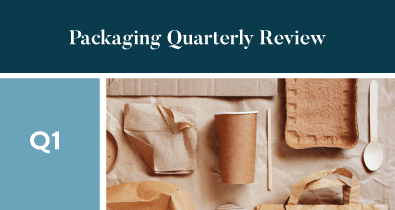
Packaging Quarterly Review Q1 2025
In a major shift toward a more protectionist trade policy, the U.S. administration has announced the implementation of new reciprocal tariffs, including a baseline 10% tariff on all imports (at… Read More

Active Nutrition: Trends Shaping the Sector in 2025
In 2024, key trends drove category activity in the active nutrition sector. Now, Lincoln International’s Consumer Health experts have identified key factors poised to influence the active nutrition sector in… Read More

Constantijn Crans
Constantijn providers mergers and acquisitions (M&A) advisory services to private equity firms, corporations and entrepreneurs. He has extensive experience executing sell-side and buy-side M&A transactions, as well as corporate carve-outs, capital… Read More

Women’s Wear Daily | Beauty High Stakes: Sell, Shut Down or Keep?
Published by Women’s Wear Daily on April 18, 2025 Ashleigh Barker, Director and head of beauty and personal care in Lincoln’s Consumer Group, recently shared her insights into strategies for… Read More

Strategic Shifts in the UK Wealth Management Market: A Deep Dive into Recent Trends and Future Outlook
The UK’s addressable wealth management market is valued at over £2 trillion, with approximately 30% serviced through the financial advice sector.[1] Despite its considerable size, the industry is still… Read More

Cyber Roadmap: 2025 and beyond

Athletech | Inside the New Fitness Economy
Published by Athletech News on April 8, 2025 Kyle Perreira, Director and leader of Lincoln’s outdoor, fitness and experiential sector, recently provided insights for brands and fitness operators in an… Read More

State of the Fitness Market: 2025 Edition
2025 Fitness Market Update The fitness industry enters 2025 with strong tailwinds, building on multiple years of sustained growth and transformation. Following the pandemic-era disruptions and inflationary headwinds, 2024 marked… Read More

Automotive M&A: Electrification in the Spotlight
Automotive original equipment manufacturer (OEM) suppliers have faced extraordinary challenges between 2018 and 2024. The implementation of the Worldwide Harmonized Light Vehicles Test Procedure (WLTP) in 2018 resulted in several… Read More

Fortifying Returns in Commercial Security Systems Replacement & Services
State of the Sub-Sector: Presented by Lincoln International and STEER Partners The broader fire & life safety industry has been driving transaction headlines for several years, and the commercial… Read More

Six Key Themes from Infrastructure Investor Global Summit 2025
Lincoln International’s Energy Transition, Power & Infrastructure Group recently attended the 2025 Infrastructure Investor Global Summit, one of the industry’s largest events that brought together 3,000 of the world’s top… Read More

Handelsblatt | How Private Equity Investors Are Consolidating the German Consulting Industry
Published by Handelsblatt on April 2, 2025 Friedrich Bieselt, Managing Director and head of Lincoln International’s Business Services Group in Europe, recently shared insights with Handelsblatt on the private equity-led… Read More

2025 Furniture Sector Outlook
In an uncertain economic climate in 2024, investors and companies adopted a “wait-and-see” approach, prolonging a slowdown in home sector mergers and acquisitions (M&A) activity. Valuation gaps between buyers and… Read More

Licensing as an Exit Strategy: Maximizing Brand Value
The brand licensing industry generated over $350 billion in global retail sales in 2023 and outperformed the overall global retail market.1 For fashion and apparel brands, licensing offers a unique… Read More

Private Equity’s Continued Confidence in Fund Administration, Trust and Corporate Services
The fund administration, trust and corporate services (FATCS) sector continues to exhibit resilient growth, driven by enduring structural factors. With global capital expanding, regulatory challenges increasing and outsourcing on the… Read More

Cybersecurity Report: Year-end 2024
In 2024, cybersecurity mergers and acquisitions (M&A) and growth investments saw a massive rebound, fueled by slowing inflation, stable interest rates, healthy spending growth and available capital across a widening… Read More

Investors Should Target B2B Ingredients in 2025
B2B ingredients have emerged as perhaps 2025’s most promising theme in the food and beverage sector. Many favorable tailwinds and trends—e.g. health and wellness, cleaner ingredient labels, the proliferation of… Read More

Philipp Isbarn
Philipp provides mergers and acquisitions (M&A) advisory services to private equity firms, their portfolio companies and other businesses in the DACH region. Philipp leverages deep sector expertise across the software… Read More

Dr. Karl Popp joins Lincoln International as a Senior Advisor
Lincoln International, a leading global middle market investment bank, is pleased to announce that Dr. Karl Popp has joined the firm as a Senior Advisor. Karl brings over three decades… Read More


